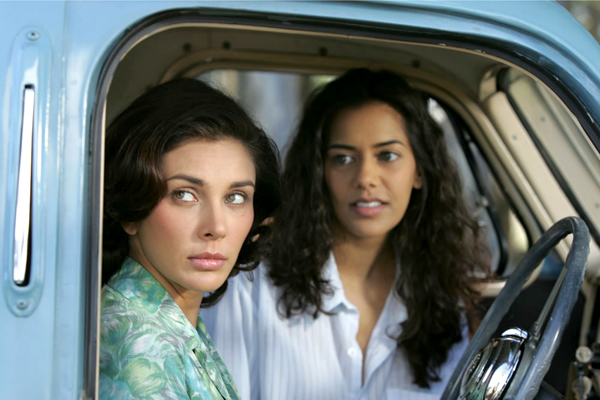|
Reviews of Recent Independent, Foreign, & Documentary Films in Theaters and DVD/Home Video

THE WORLD UNSEEN
By 1952, South Africa was uneasily adjusting to the institutionalization of apartheid after the National Party government began passing rigidly restrictive racial laws in 1948. Shamim Sarif’s film, based on her descriptive debut novel, has an intriguing focus, the impact of the new laws on a Muslim community of Indian immigrants—even if the plight of suppressed women in arranged marriages is bordering on cliché in films. But Amina (Sheetal Sheth) is an unusual woman in any film. She wears so many flamboyantly rebellious hats on her gorgeous mane it is amazing she can stand up. She runs a café with an older “colored” man, Jacob (played by David Dennis with considerable gravitas), and boldly challenges expectations of tradition, dress, work, and marriage, striding purposefully through town and bush in trousers as a young Jill of all trades—entrepreneur, political rebel, let alone sexual liberator. Into her café ventures shy Miriam (Lisa Ray). She had accompanied her gruff husband Omar (Parvin Dabas) from Bombay as a dutiful wife, mother, and shopkeeper, resigned to his violent outbursts and his affair with his sophisticated sister-in-law—until Amina smiles at her and rocks her world. They and their extended families’ complicated stories, past and present, touch on a panoply of black/white/Indian/mixed-race issues. These serve to very movingly depict how racist attitudes that had been informally enforced by intense pressure within each community became harshly codified and implemented with official police brutality. However, these relationships were clearer in the novel as the flashbacks are sometimes interspersed confusingly. The very appealing cast brings
together physical beauties who stood out in other films from around the
world for their looks as well as their emotive talents—Ray in Deepa
Mehta’s Water, Sheth in Albert Brooks’s Looking for Comedy in
the Muslim World, and Dabas in Monsoon Wedding. They are
similarly visually striking here as filmed by cinematographer Michael
Downie, who flatters them as much he does the distinctive
landscape. When the dialogue and pacing get bogged down in L Word
soap opera and the rich social context fades to mostly background, they
still hold the eye’s attention. Nora Lee Mandel
|

